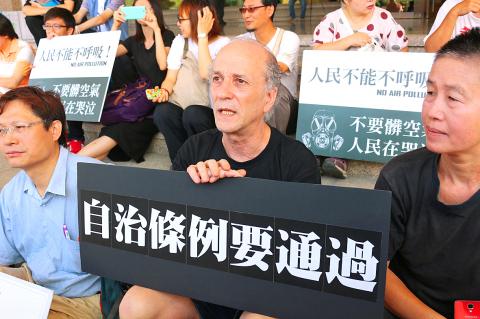The Yunlin County Council yesterday passed local legislation prohibiting the county’s industries from burning soft coal and petroleum coke, but environmental campaigners voiced concern that the central government might reject the regulations, sinking their campaign against air pollution.
Anti-PM2.5 Youth Action Alliance convener Chang Chia-wei (張家偉) said that yesterday marked the first council session to discuss the bylaw, which county councilors put to a vote and passed before noon.
The outcome was “totally unexpected,” Chang said.

Photo: Chan Shih-hung, Taipei Times
He said that the bylaw’s passage could inspire other municipalities in central and southern Taiwan to follow up on banning the fuels, thereby improving air quality.
However, he said that the bylaw, proposed by Yunlin County Commissioner Lee Chin-yung (李進勇) of the Democratic Progressive Party (DPP), was passed without a plenary of the DPP caucus, which he suspected could be due to conflicting stances on the issue among county councilors and the county government.
Citing a statement by the Ministry of Economic Affairs, Chang said that there is a high probability that the bylaw would be rejected by the Executive Yuan, which could reflect badly on the county government, as it would draw on public opinion that Lee was just “putting on a show” about cutting industrial air pollution.
The ministry last month said that if all six central and southern Taiwan municipalities that signed a petition against the use of soft coal and petroleum coke were to ban the fuels from being used at coal-fired power plants, Taiwan would face a nationwide power shortage.
According to Chang, some county councilors who attended the session yesterday said that Lee has the authority to deny power plants permits to burn the fuels and that Lee could be using the county council as a “scapegoat” to circumvent public censure if the bylaw is rejected.
Meanwhile, employees of Mailiao Power Corp, a Formosa Plastics Group (FPG, 台塑集團) subsidiary that manages a naphtha cracker in Yunlin, said the ban would result in many of the workers there losing their jobs.
Corporation union director Wang Chen-wei (王鎮緯) said that the permits for two power plants in the complex to use soft coal and petroleum coke would expire next month and in July respectively, and if Lee does not renew the plants’ permits, they might go bankrupt or close down.
He called on Lee to renew the permits.
Wild at Heart Legal Defense Association founder Robin Winkler called Mailiao Power’s remarks a “classic ploy” of an industry trying to avoid its responsibilities by pitting a labor rights issue against an environmental one.
Winkler questioned the legitimacy of Mailiao Power’s statement, saying that the company is attempting to create a “false issue.”
Meanwhile, the ministry poured cold water on the Yunlin Country Government legislation, saying that it would affect the nation’s power generation and the public’s right to electricity.
Citing Article 6 of the Energy Administration Act (能源管理法) and Article 20 of the Air Pollution Control Act (空氣汙染防制法), the Bureau of Energy said it is the central government that has the authority to ban the burning of petroleum coke and coal for power generation.

DAREDEVIL: Honnold said it had always been a dream of his to climb Taipei 101, while a Netflix producer said the skyscraper was ‘a real icon of this country’ US climber Alex Honnold yesterday took on Taiwan’s tallest building, becoming the first person to scale Taipei 101 without a rope, harness or safety net. Hundreds of spectators gathered at the base of the 101-story skyscraper to watch Honnold, 40, embark on his daredevil feat, which was also broadcast live on Netflix. Dressed in a red T-shirt and yellow custom-made climbing shoes, Honnold swiftly moved up the southeast face of the glass and steel building. At one point, he stepped onto a platform midway up to wave down at fans and onlookers who were taking photos. People watching from inside

A Vietnamese migrant worker yesterday won NT$12 million (US$379,627) on a Lunar New Year scratch card in Kaohsiung as part of Taiwan Lottery Co’s (台灣彩券) “NT$12 Million Grand Fortune” (1200萬大吉利) game. The man was the first top-prize winner of the new game launched on Jan. 6 to mark the Lunar New Year. Three Vietnamese migrant workers visited a Taiwan Lottery shop on Xinyue Street in Kaohsiung’s Gangshan District (崗山), a store representative said. The player bought multiple tickets and, after winning nothing, held the final lottery ticket in one hand and rubbed the store’s statue of the Maitreya Buddha’s belly with the other,

‘NATO-PLUS’: ‘Our strategic partners in the Indo-Pacific are facing increasing aggression by the Chinese Communist Party,’ US Representative Rob Wittman said The US House of Representatives on Monday released its version of the Consolidated Appropriations Act, which includes US$1.15 billion to support security cooperation with Taiwan. The omnibus act, covering US$1.2 trillion of spending, allocates US$1 billion for the Taiwan Security Cooperation Initiative, as well as US$150 million for the replacement of defense articles and reimbursement of defense services provided to Taiwan. The fund allocations were based on the US National Defense Authorization Act for fiscal 2026 that was passed by the US Congress last month and authorized up to US$1 billion to the US Defense Security Cooperation Agency in support of the

‘COMMITTED TO DETERRENCE’: Washington would stand by its allies, but it can only help as much as countries help themselves, Raymond Greene said The US is committed to deterrence in the first island chain, but it should not bear the burden alone, as “freedom is not free,” American Institute in Taiwan Director Raymond Greene said in a speech at the Institute for National Defense and Security Research’s “Strengthening Resilience: Defense as the Engine of Development” seminar in Taipei yesterday. In the speech, titled “Investing Together and a Secure and Prosperous Future,” Greene highlighted the contributions of US President Donald Trump’s administration to Taiwan’s defense efforts, including the establishment of supply chains for drones and autonomous systems, offers of security assistance and the expansion of